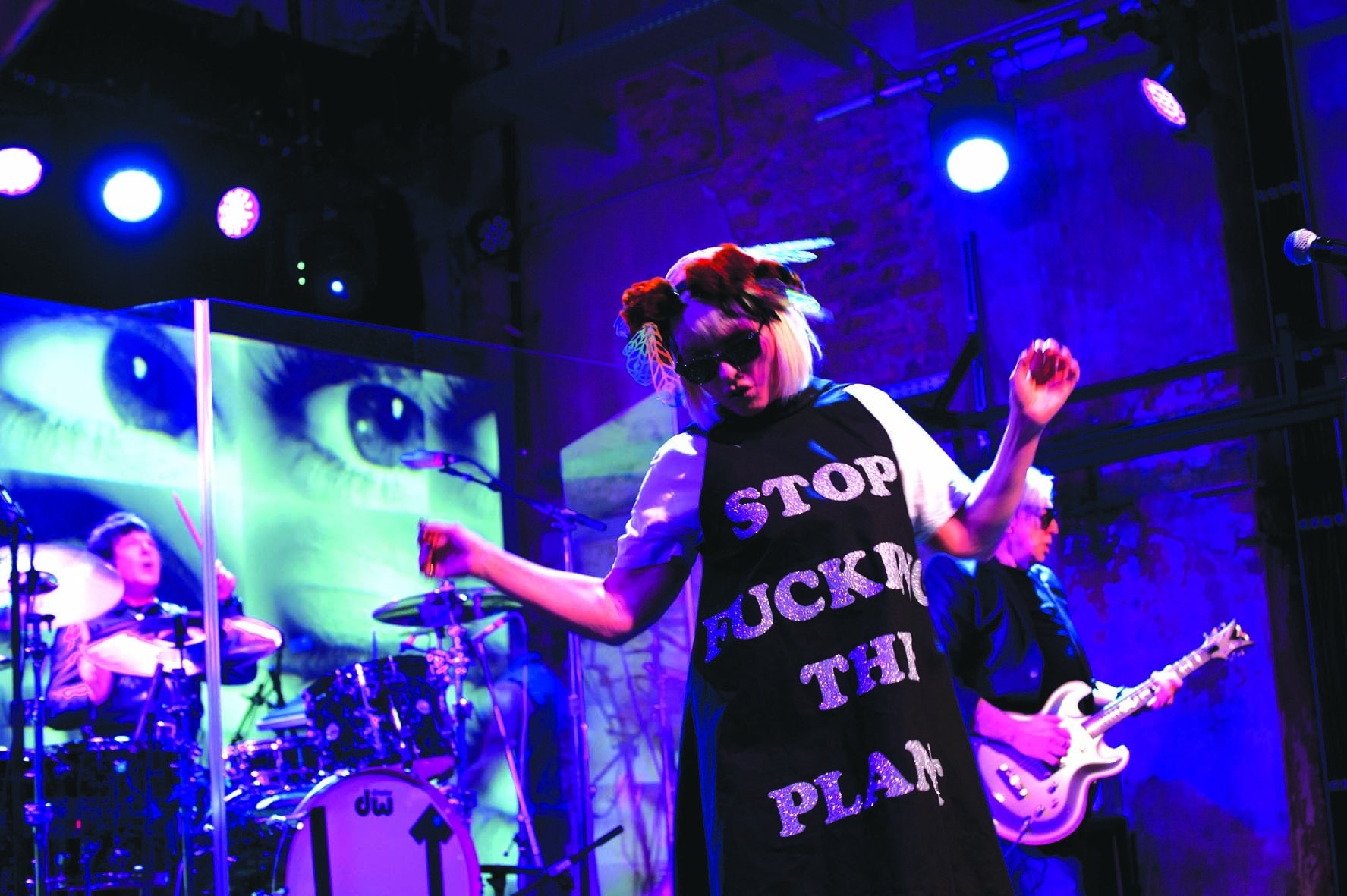
This article is a preview from the Winter 2019 edition of New Humanist
They are like a G8-style lineup of young leaders, captured in a 1980 photograph in Debbie Harry’s new memoir Face It. In the back row: Siouxsie Sioux, Viv Albertine and Harry. In the front: The Selecter’s Pauline Black, Poly Styrene of X-Ray Spex and Chrissie Hynde. It’s a remarkable image. Six punk stars in their prime. All born between 1945 and 1957.
Together with Marianne Faithfull and Annie Lennox, they are our first generation of female rock elders, worthy of comparison with the female politicians and public figures of their baby boomer generation. They were the first to break through in significant numbers into the most male-dominated of mass audience worlds: pop and politics.
There is a scream – a full-on girl scream of rage and defiance 48 seconds into The Slits’ song “Shoplifting” – that stops me in my tracks every time for its sheer audacity. Forty years on from its release on the album Cut, the shock these young women caused is audible and alive. There is no sound like its sheer aggression in the music of contemporary female pop stars.
You might not see an obvious comparison between the Slits’ erstwhile bandmember and guitarist Viv Albertine and sober German Chancellor Angela Merkel (who didn’t go to look at the Berlin Wall the night it opened because it was sauna night in her schedule). But more unites them than being born in the same year (1954) – not least the combination of ambition and biding one’s time.
Many successful female politicians of the era began their careers later than men, and the same is true for these pioneering musicians. Unlike many of their male punk equivalents, Hynde was already close to 30 when The Pretenders broke through. Harry, an adopted child raised in suburban New Jersey, was obsessed with Manhattan from a young age and was already into her fourth decade when her carefully cultivated persona of Blondie stormed the UK charts. It was a kind of drag, playing knowingly on the self-invented image of Marilyn Monroe. It is comparable to Thatcher’s very different but equally deliberate Iron Lady persona, with her lowered voice and authoritative air.
“The first song I ever wrote when we started Blondie was a song called ‘Platinum Blonde’,” Harry reminded me when I interviewed her recently, “about the screen stars and how the hair would just light up the screen and it was such a device. It all fell into my lap because I was working as a beautician. On a quiet day, they said, ‘Oh, let’s bleach your hair,’ and I became the dummy, and it just evolved, and people said, ‘Hey, blondie, hey, blondie.’”
Not that male rock managers and most journalists ever understood the artifice. Even in 2019, a Washington Post review of her memoir was headlined: “Debbie Harry proves she’s more than just a pretty blonde in tight pants.” After a furious backlash on social media, the newspaper quickly reworded the headline and apologised. At least some things are changing.
But if the #MeToo movement has seen tangible changes in how fast the public call out sexist and demeaning reporting about women, there is a complexity, too, in revisiting historic abuse. In Face It, Harry recounts being raped by a robber armed with a knife, as she and her then partner and fellow band member Chris Stein returned home from a gig. They had no money, because they’d spent their last dollars buying cookies from the deli. “He piled up the guitars and Chris’s camera and then he untied my hands and told me to take off my pants.” Harry wrote. “The stolen guitars hurt me more”.
Chrissie Hynde unintentionally made headlines four years ago when she recounted a rape by a Hell’s Angel gang member when she was just 21. She thought he was taking her to a party, but in fact he took her to an empty house. She said: “Technically speaking, however you want to look at it, this was all my doing and I take full responsibility. You can’t fuck about with people, especially people who wear ‘I Heart Rape’ and ‘On Your Knees’ badges ... those motorcycle gangs, that’s what they do.”
It is a kind of war story. I am reminded of talking to Ann Leslie (born 1941), the veteran Fleet Street foreign reporter, in the Newsnight green room. At the time, the Jimmy Savile revelations were prompting a national scandal about entertainment industry predators. She told me how she would stub out a cigarette on the hand of a groper. For women like Harry and Hynde, as for Leslie, there was a choice to be made about not being defined as a victim. It was a choice made in a different time, and one I’ve come to understand more and more as the years pass and new sexual harassment and assault scandals emerge not just from the music and film industry but from the Houses of Parliament.
There is an advertising poster for my old girls’ private school that shows a schoolgirl speaking at the dispatch box in the House of Commons – the tag line being something like “you never know where your education will take you”. Thatcher, May, Sturgeon, Harman, Swinson, Phillips – modern girls have had two generations of parliamentary women as role models. From Taylor Swift to Arianna Grande, they also have female superstars to dream of emulating. But the likes of Albertine did not: “We hadn’t spent years in front of a mirror with a microphone or a tennis racquet pretending to be in a band like all our contemporary male bands had,” she says. “We thought: we are not going to follow in men’s footsteps. We’re going to make our own sound, our own rhythms. We rewrote it all completely.” Like an old timer remembering getting the vote, Albertine reminds me: “You know everyone who came to see us had never seen a girl on stage before. With a guitar. Can you imagine that now? Or they had never seen a girl playing drums. They’d stand there with their mouths open.”
There is a fundamental lack of self-pity in these women, as there is amongst the female politicians who made it in the 70s and 80s. Each has a story of how unwelcome women were made to feel in their parliaments. Merkel’s career trajectory has its roots in her tenacity in another overwhelmingly male world – she worked as a research scientist before entering politics after the Wall came down. It is a story of unglamorous authenticity – all the evidence suggests she refused to inform on others, unlike huge numbers of fellow East Germans.
Albertine’s second memoir To Throw Away Unopened – is another adventure in authenticity. But one forged in anger. After her mother’s death, she wanted to explore the cause of that fury. “None of the Slits had fathers,” she observes. “We ran around the streets like Dickensian orphans without parental control. I don’t think we could have been the rebellious, radical, out-of-control, noisy, going-against-the-grain girls we were [otherwise]. And the way we looked, the way we dressed, the way we behaved . . . I mean, we were hated, hated on the streets, abused, attacked, everywhere we went. And if we’d had fathers at home, fathers we loved just as much as fathers we didn’t get on with . . . In those days, men, fathers, they had the best chair . . . you kept quiet when father came home. He had the best slice of meat. Father ruled then.”
Now, 40 years on from those angry early years, our elder stateswomen of rock have chosen different paths. Annie Lennox has, for decades, used her profile to promote long-term campaigning, notably for HIV prevention and treatment in Africa, for disempowered women and against racism here in Britain (she spoke up for Stephen Lawrence at the Eurythmics reunion performance at the 1999 Brit Awards). Hynde has more time for her rather accomplished painting. Her new record Valve Bone Woe is a skilful album of jazz and trippy covers – shaped by the influence of her elder brother. She was too wild as a teenager to appreciate jazz, she says. She sings elegantly and convincingly in French for “Que rest-et-il de nos amours?” But don’t compare her to Julie London. “No, it’s rock ‘n’ roll. You just be yourself. Nothing ever changes. I didn’t wear a strapless ballgown or anything just because I was playing with an orchestra,” she points out.
The confident physical appearance of these women, whose posters adorned the walls of thousands of male and female fans, is striking too. Hynde is immediately recognisable with her heavy dark fringe and smoky black eyeliner, combined with the wrinkles and lines of a woman in her sixties. Marianne Faithfull’s latest album Negative Capability shows her proud with her walking stick. She draws younger musicians to her Paris apartment like a flame to co-create fierce and raw stories in music, reflecting on the 2015 Bataclan Islamist massacre, about friends dying from cancer. She dares to revisit her teenage hit “As Tears Go By”, her voice a ravaged spectre. “It’s a way for people to recognise me,” she told me, “and it’s my calling card. But don’t call it nostalgia. I’m not a looking back kind of person. I don’t have an ounce of nostalgia in me . . . All of you do. Every journalist I talk to wants to look back but I don’t. I live in the present.”
Faithfull says she was always misunderstood: “First they thought I was a pop chick, obviously, then Mick Jagger’s girlfriend, then ex-girlfriend, then I was a whore, then all sorts of weird things which I’m not.”
Gloria Steinem once said she was living out the unlived lives of her mother. Albertine says she’s always loved that quote. “It absolutely encapsulates what my life has been.”
One of the saddest parts of Harry’s memoir is the repeated financial exploitation of naïve but honest musicians by reckless managers; a story that has afflicted too many men, as well as women. In her case, she and her partner Chris Stein were left without health insurance as he struggled with a near-fatal illness, reliant on the kindness of a doctor to stop him being thrown out of hospital.
One can’t help thinking of Taylor Swift’s determined actions to maintain control of her music – battling both Spotify and Apple Music over streaming royalties, and her current stand-off with the new owner of the masters of her first six albums – as a determination to live the unlived life of Harry. Madonna (born 1958), with her tight grip on her business affairs and her constant reinvention, is perhaps the truer role model – pop star still very much in the game and running for re-election.
Perhaps Madonna’s memoir will come one day. But in the meantime we have Harry, Hynde, Albertine, Lennox and Faithfull. They are all passing on the riches of their maturity through music or autobiography or – in the case of Lennox – art installation.
All hail the pop divas, transformed into a sisterhood of wise women.

